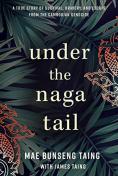
by Taing James Taing; Bunseng Mae
Hardcover- $23.14
Click on the ORANGE Amazon Button for Book Description & Pricing Info
Overall rating:
How would you rate this book?
Member ratings
Under The Naga Tail, Mae Bunseng Taing, James Taing
This book reads like a personal conversation. It is stunning in its emotional reach to the reader as it describes the turmoil that descended on this part of Asia in 1975 with Pol Pot’s Khmer Rouge’s successful revolution. Very simply, without fanfare, the experiences of this one time wealthy and privileged family come alive. In its telling of their terrible journey to freedom after the radical Communist group took over Cambodia and remained in power for four long years, with its disastrous effects lasting far longer, it is authentic. This part of Asia had already experienced Communist horrors in Vietnam and Laos. As a result, other countries, like Thailand, were afraid to help because of the contagion of the red virus that they were also fighting. They, therefore, behaved intolerably toward escaping Cambodians.
In Cambodia, they were forced to surrender all their worldly goods and land, even pots and pans, they were then forced out of their homes and taken to camps where they were overworked and starved. For a period of five years, Mae Taing is shunted from one horrible situation to another, each debilitating him and his weakening father, whom he tirelessly protected and rescued, although it was forbidden. Mae witnessed atrocities that no one should, suffered abuse no human should inflict upon another, and finally got to the country he dreamed of as a boy, after five long years. Fortunately, the brother he thought had died, had previously escaped to America and lived in Connecticut. He proceeded to rescue and reunite many of the family members, after years of chaos and pain, aided by American organizations.
The Khmer Rouge simply robbed everyone they could and lived off those they stole from. With their power, lies and weapons, they were able to force the people into a kind of slavery. They murdered, plundered and lied with abandon. The young and old, rich and poor were supposed to live as one, and worship only Angkar, the nebulous Khmer Rouge organization. Devotion to anything or anyone else, even parents and siblings, was forbidden. Although I have read other books on surviving this cruel time of history, in this part of the world, this book illustrates the suffering far more realistically than any I have read in the past. It is direct, honest and open in all of its revelations.
Although the United States, with their bombs, ultimately bears some, even perhaps a lot, of blame for the suffering of these previously gentle, Chinese Cambodians who were turned into refugees and then enemies, in their country, in the end, they were the only ones who also came to their rescue. Neighbors turned their backs on neighbors, distrust permeated the country and the minds of the people to make them cruel to each other and turn against each other. People were subjected to heinous acts of barbarism. In one instance, they were shipped to a mountain and forced down from the top to expose and clear landmines. As they ran, trying to escape, they blew themselves and others around them to kingdom come. The unfit were in charge and the victims were helpless. Although the Chinese were hopeful that China would eventually rescue them, that never did happen.
Although this book needs some good editing, it deserves five stars because of its content. I wondered, however, how, since several times they were asked to give up all their belongings to survive, somehow, they always had more belonging. This was not explained, nor was it explained how their mother’s diamond ring was saved. Some of the juxtaposition of words is also confusing and it was repetitive at times, because of the nature of the memoir. Still, the family’s 5-year journey to freedom was alive on the page and was, therefore, hard to read in one sitting. It required a breather to absorb the horrors that they dealt with, and yet, most were lucky enough to survive, in the end, in spite of the brutality. Bravery, perseverance, courage, and devotion and loyalty to each other paid off in the end.
From what I learned, the Naga is a mythical creature that consumes its own, its mouth eating its tail for eternity. Perhaps that is what Communism is, a futile, self-destructive, all-consuming evil that truly benefits no one. Today, the countries in that part of Asia have changed somewhat. Vietnam is a Socialist Republic, similar to Communism, Laos is still Communist, Cambodia still has a former Khmer Rouge Communist as its Prime Minister, but is considered a Constitutional Monarchy, like Thailand, that fought Communism when the neighboring countries were defeated. Communism has definitely left its mark on this region.
Book Club HQ to over 90,000+ book clubs and ready to welcome yours.
Get free weekly updates on top club picks, book giveaways, author events and more








